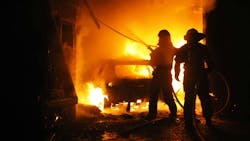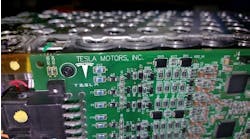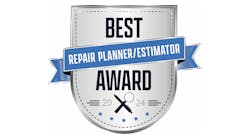Insurance coverage for garagekeepers is complex, more so than standard business insurance, and it can be a hassle to figure exactly what your shop needs to be covered correctly.
David Willett, chief underwriting officer for Spark Underwriters, says far too often he sees shops spend too little time focusing on their own insurance.
“I can't tell you how many times I hear someone say, 'I can't understand how the public buys their auto insurance from somebody just because they have a cute animal on their advertisements,'” Willett says. “Well okay, shop owner, but are you maybe doing the same thing with your business insurance? Are you buying it because it's a big name you know about, or are you are you buying it because they're in the industry and are giving you the best coverage for your shop?”
Though it can be a daunting task, Willett says taking the time to carefully review your garagekeepers’ insurance will make sure you and your team are prepared for any situation that may arise in your shop.
First and Foremost
Willett says it’s all too common for shop owners, especially those who run smaller operations, to try to navigate their insurance situation without much effort or thought put in.
“The lack of claims knowledge in the industry has bugged me, and it bothers me that people don’t invest in talent. You’ve got to have expertise. If you don’t have that expertise, you often will have wasted time on a claim.”
In a classic example of you get out what you put in, Willett says a lot of more common business insurance providers don’t have tangible experience in the automotive repair industry. That, he says, means they’ll try to avoid a claim at all costs, even if it comes at a detriment to a shop owner.
“They don't necessarily know how to test out a solution to see if it's the right one when a claim comes around until they, unfortunately, have to deal with a big one.”
When choosing an insurance provider, it’s critical to work with someone that has experience in the collision repair industry, that has been inside a shop before and knows what problems are facing the shop owners and managers today.
Willett says working with insurance providers that are intimately familiar with industry issues such as tech shortages, parts procurement, ADAS calibration and others helps when filing a claim because you’re speaking the same language and are on the same page.
“When choosing an insurance provider, you need to think about their ability to handle your claims first,” Willett says. “You need to find somebody who can work in your shop.”
Special Circumstances
The automotive industry is quickly and continuously evolving. Not only does your shop need to keep up with the times, but so does your insurance.
Willett says it’s a good idea to start asking your insurance provider about situations and scenarios that may not be all that common now but could be in the coming years. He says autonomous vehicles serve as a perfect example.
“Let's say you've got an autonomous vehicle in one of your insured shops, and they need to take on a test drive. They put it in autonomous mode, and an accident occurs. Who's responsible for that? Who's going to pay for that?” Willett says. “We know we're going to take care of it because we have the coverages and the policies, we have contacts with the OEMs. Ask your insurance providers if their policies cover autonomous vehicles and watch their heads spin.”
Another example of the industry changing and evolving is actually a callback to its past, too. Willett points to site pollution coverage and pollution clean-up as other key coverage points to have in your insurance.
Pollution coverage used to be essential in the days of lead paint, but that started to fall out of vogue after the manufacture of lead paint for households was banned in 1978. However, Willett says interest in the coverage is ratcheting back up with the inclusion of more chemicals in different parts and fluids used in the collision repair business.
And while headlines over the last few years have called out the environmental hazards of EV fires, Willett says ICE vehicle fires aren’t any easier to deal with.
“We're not any more or less concerned with EVs than we are with ICE vehicles,” he says. “ICE vehicles catch on fire, too, and they sometimes have a bigger fire load, especially if you're not dealing with private passenger vehicles.”
Because of all of that, Willett says it’s important to ask your insurance if there’s any pollution coverage on your policy for your shop and what the pollution clean-up cap is.
“We go up to $200,000 in pollution clean-up. We compete regularly with people that only go up to $25,000. The EPA can't show up for $25,000,” he says. “That's just covering a normal occurrence and cleaning up after one.”
Find the Answers
As mentioned earlier, it can be daunting to try and figure out how to make sure you’re getting the best insurance coverage for your shop. Willett encourages getting creative and checking with every corner of your network to see what other people are doing.
In addition to asking for advice from people you admire, he suggests calling people in the industry that aren’t necessarily shop owners to see if they have any advice on how to get the best bang for your buck with insurance.
“Call a paint supplier up and ask what insurance companies actually connect with and work with them,” Willett says. “Call an OEM and ask what insurance companies work with them.”
As long as you’re seeking out people with experience and are asking as many questions as possible to people who are familiar with the industry, Willett says you’re on the right track.
“Work with someone who's been in the industry, who's been inside your shop and is working on your committees,” he says.



